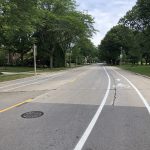Bill Could Help ‘Innocent Purchasers’ Clean Up Contaminated Property
While previous bills have failed, backers offer new funding options that could pave the path forward.
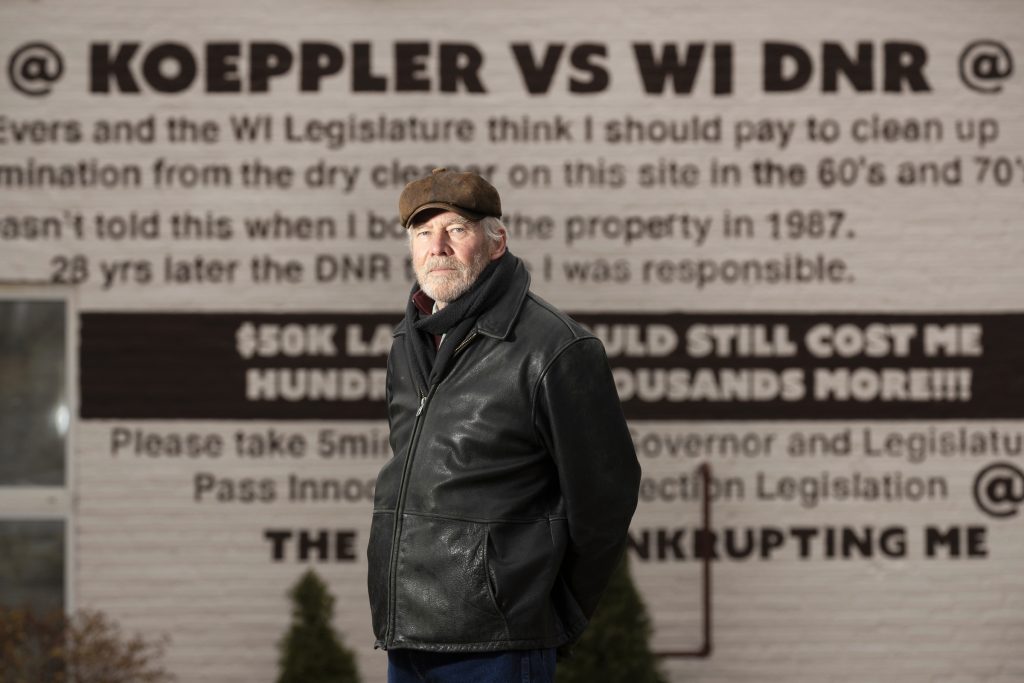
Ken Koeppler is being held liable for contamination beneath a building he owns in Madison, Wis., despite the fact he was never involved in the dry cleaning business that operated there in the 1950s and 1960s. “I was in grade school when these people were dumping chemicals there,” Koeppler says. The building had been converted into residential housing before he purchased it in the 1980s. He is shown Nov. 29, 2021 in Madison, Wis. (Mark Hoffman / Milwaukee Journal Sentinel)
When Ken Koeppler first heard the Wisconsin Department of Natural Resources wanted to visit his property, he didn’t think he had anything to worry about.
Koeppler, a Madison resident, bought the building in 1987 and lived there for 17 years before turning it into a rental property. In 2015, the DNR asked Koeppler if it could drill into the basement to check for contamination.
“I said, ‘Of course, let’s find out if there’s something going on here,’ and I feel that they misled me at that time,” Koeppler said. “As soon as they had taken vapor samples underneath my building, they named me the responsible party for all aspects of anything having to do with the contamination that was down there.”
That determination has cost Koeppler $55,000 and counting. So far, he has covered the price of three monitoring wells and their permits, exhaust fans, extensive testing and legal services. While he estimated the total could eclipse $150,000 in the next few years, Koeppler has dug his heels in on pending costs — hopeful that proposed legislation may relieve him of financial liability once and for all.
Lawmakers from both parties in recent legislative sessions have pushed a bill that would help “innocent purchasers” pay to clean up contamination they did not cause. Previous attempts fell through, in large part due to lack of funding.
This session, a bipartisan group of lawmakers has again introduced the same bill — this time with new potential funding options. Separately, Gov. Tony Evers is proposing in his 2023-25 state budget to offer even broader eligibility for funding to individuals who can show they thoroughly investigated potential contamination before buying a property.
‘Spills law’ at issue
Under Wisconsin’s “spills law,” any individual who causes, possesses or controls a hazardous substance discharge is liable for cleaning it up — even if they aren’t responsible for the contamination.
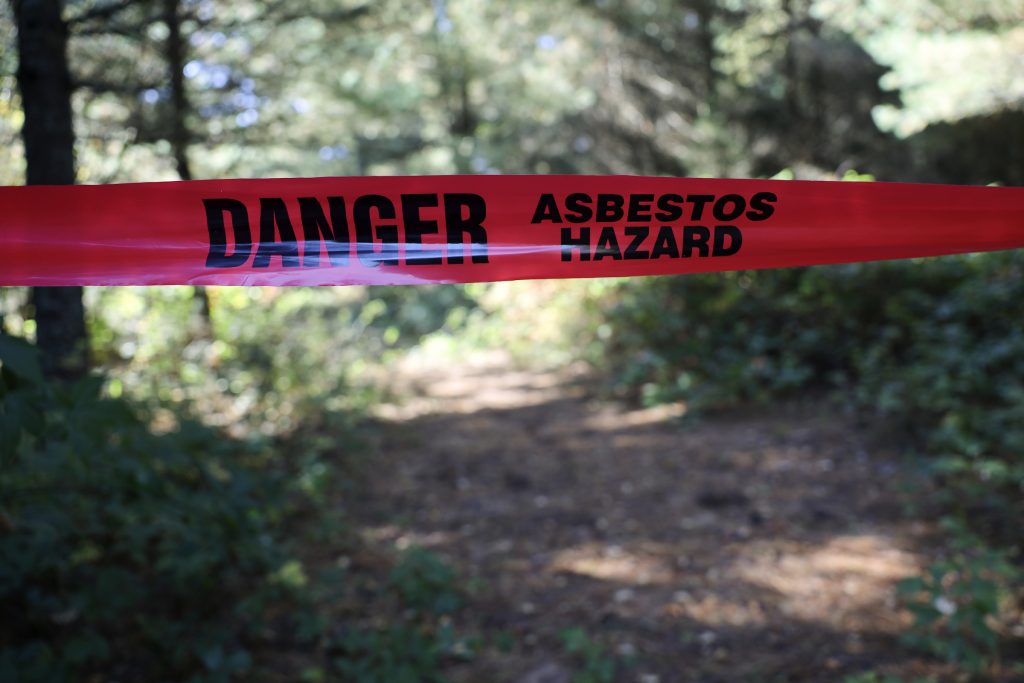
Caution tape on Zach Skrede’s property in the Town of Easton, in Adams County, Wis., is seen on Oct. 10, 2022 warning about the presence of asbestos. Skrede purchased his house and the surrounding land in 2019, and did not know the asbestos was on the property. Republican and Democratic lawmakers in Wisconsin have renewed legislative efforts to help “innocent purchasers” pay to clean up contamination they did not cause. (Coburn Dukehart / Wisconsin Watch)
“I was in grade school when these people were dumping chemicals there,” Koeppler said.
“I don’t blame the DNR, but … I feel I suffered for being a good citizen and responding (to them).”
Inspired largely by Koeppler’s story, legislation proposed previously in 2017 and 2021 would have helped people in similar situations by creating specific liability exemptions.
Wisconsin Watch previously reported that while public funds exist to help municipalities and businesses clean up environmental contamination, people typically lack access to similar assistance.
For example, Koeppler, as a private landowner, could not obtain state or federal funds to cover costs of mitigation. The city of Madison and the DNR were able to apply for a federal brownfield grant, which provided $40,000 to build additional monitoring wells and conduct more testing at the properties of Koeppler’s neighbors.
Other legal avenues exist to vindicate private landowners, however they can be timely — and costly — to pursue.
The Department of Natural Resources has not quantified how many “innocent purchasers” exist in the state, but the department estimated in 2021 that the bill would impact 5-10% of 16,600 known sites reported under the spills law.
‘Strong bipartisan support’
Sen. Andre Jacque, R-DePere, has supported the legislation since its first introduction in 2017.
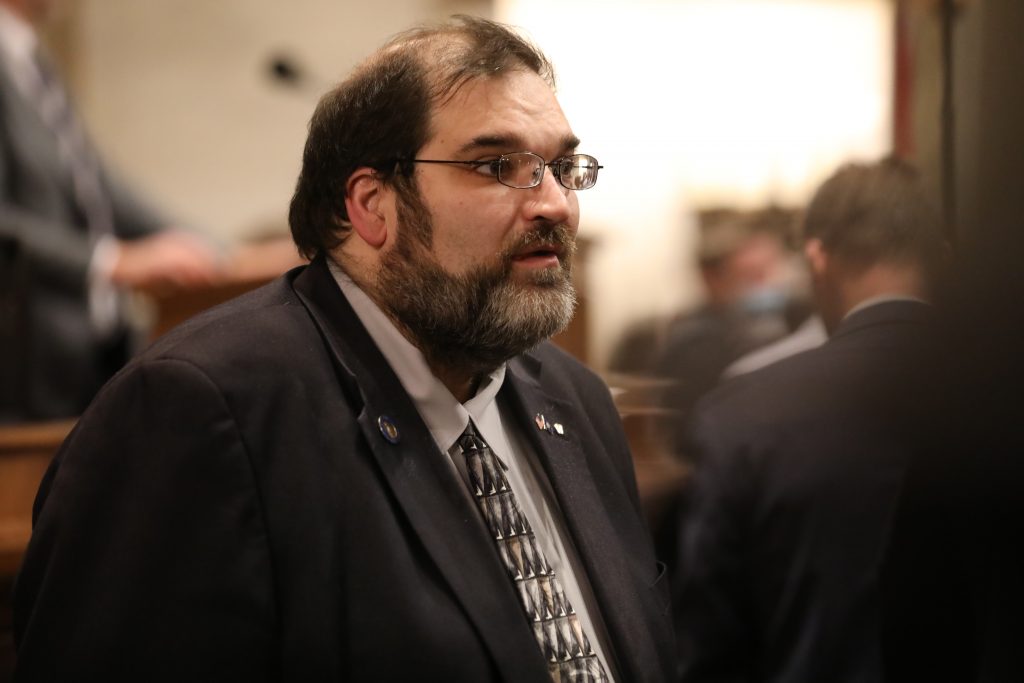
Wisconsin state Sen. Andre Jacque, R-DePere, is seen during Gov. Tony Evers’ State of the State address at the Wisconsin State Capitol in Madison, Wis., on Feb 15, 2022. Jacque supports legislation to help certain “innocent purchasers” pay to clean up environmental contamination they did not cause. (Coburn Dukehart / Wisconsin Watch)
“It just is something that resonates with folks in terms of people being held responsible for something that they had no role in causing,” Jacque said. “There’s a reason why we’ve been able to continue to have strong bipartisan support for this proposal.”
Jacque added the bill is not saying “we don’t care about contamination issues” but rather that the state should be involved in remedying them.
Another three-time sponsor, Sen. Lena Taylor, D-Milwaukee, said the proposal balances environmental protection while ensuring Wisconsinites are not held “unjustly responsible for someone else’s error.”
“It is frustrating that in the past, whether the DNR has been operating under Republican or Democratic administration, there’s been acknowledgement that the situations that individuals are placed in are beyond their control, and yet there hasn’t been a willingness to kind of pursue the financial end of the conversation,” Jacque said.
Previous iterations of the bill have been opposed by the cities of Madison and Milwaukee, as well as environmental groups including the Wisconsin Conservation Voters and the River Alliance of Wisconsin.
In a statement to Wisconsin Watch last fall, the DNR said the agency did not believe the legislation would ensure protection from contamination and suggested it could generate hundreds of properties that cannot be used or developed due to environmental contamination — better known as “brownfields.”
In a memorandum for the 2021 legislation, the Wisconsin Brownfield Study Group, composed of scientists, legal experts and researchers, wrote: “Where a viable causer does not exist, absolution of environmental liability for the ‘innocent owner’ does not address the root contamination problem — who will pay to investigate and remediate the contamination in order to protect public health and restore the environment.”
Separate legislation, Evers’ budget offer funding options
Prospective funding options may be the key to the legislation’s third round.
Jacque has introduced separate legislation to create an environmental hazard mitigation fund under the STORM Act, a federal revolving loan program managed by the Federal Emergency Management Agency. If passed, Jacque said he plans to explore if part of the fund could go toward helping “innocent purchasers” pay for remediation.
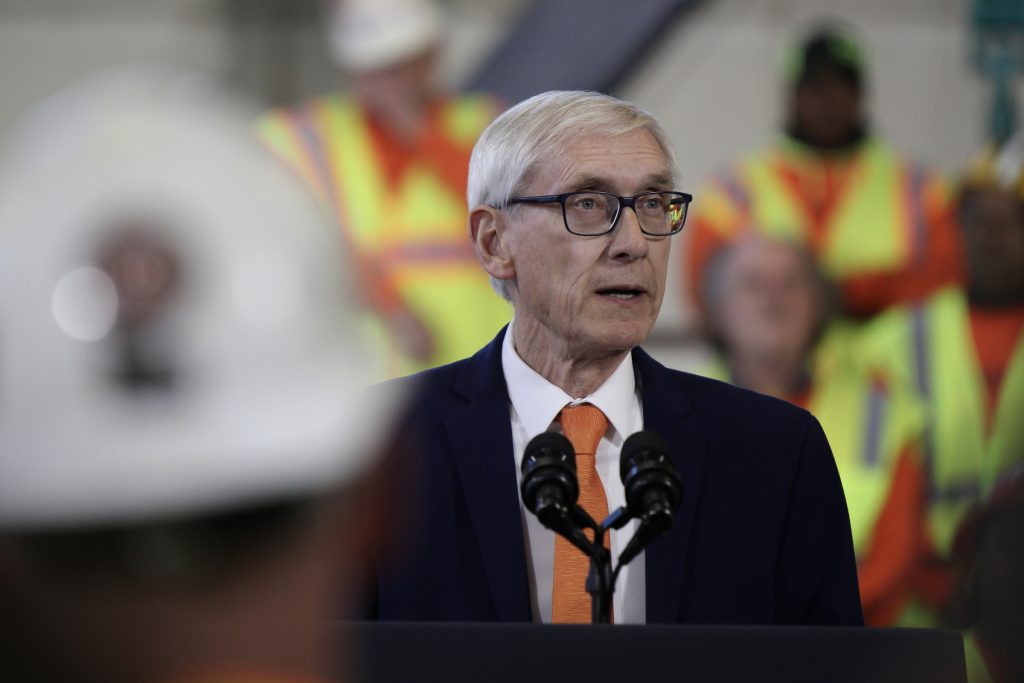
Wisconsin Gov. Tony Evers speaks before President Joe Biden’s arrival at the Laborers’ International Union of North America training center in DeForest, Wis., on Feb. 8, 2023. Evers proposes in his 2023-25 state budget to broaden eligibility for cleanup funding to people who can show they thoroughly investigated potential contamination before buying a property. (Drake White-Bergey / Wisconsin Watch)
Unveiled in February, Evers’ 2023-25 budget also proposes spending over $5.3 million in fiscal year 2024 and another $2.85 million in fiscal year 2025 to establish the Revitalize Wisconsin program.
Revitalize Wisconsin would provide direct services or funds to local governments, dry cleaners and other private parties to help address environmental contamination. In the budget bill, the “private parties” definition includes innocent landowners.
After 2006, the program would further expand eligibility to landowners who could demonstrate they followed the federal requirement to pursue “all appropriate inquiries” to determine if a property they plan to purchase is contaminated.
In a statement to Wisconsin Watch, the DNR said Revitalize Wisconsin would function as a new grant program, sunsetting the long-backlogged dry cleaner environmental response fund program, called DERF. That program reimburses former and operating dry cleaner owners to pay for cleanups — including those responsible for contamination who follow requirements to minimize future spills.
In the first fiscal year, all backlogged dry cleaner claims — currently estimated at $3.2 million — would be paid. Then, the DNR would consider other eligible applicants on a “project-by-project basis.”
If an applicant is accepted, the DNR would pay for the needed mitigation work upfront. The only applicants guaranteed eligibility are those already eligible for DERF. Sites previously eligible for DERF will continue to receive priority until all those sites are closed.
Since its inception in 1997, the state has paid $21.8 million in reimbursements to dry cleaners. The program stopped accepting new applications in 2008.
Funding questions loom large
Even with the potential funding mechanism, the political viability of either option remains unknown.
Jacque expressed general support for the Revitalize Wisconsin program’s main goals.
“I appreciate that the administration has finally acknowledged the unjust hardship it has placed upon innocent landowners by its prior position, to the extent that they even create a definition of ‘innocent landowner’ within the Revitalize Wisconsin proposal,” Jacque said.
However, Jacque raised concerns that the budget item does not explicitly address lingering legal liability questions for innocent landowners. He also would like to see if other federal funding could be tapped to help mitigate the problem.
“With so few guidelines, will this proposal just become a boon to the department’s chosen few … and leave the vast majority of innocent landowners out to dry?” Jacque asked.
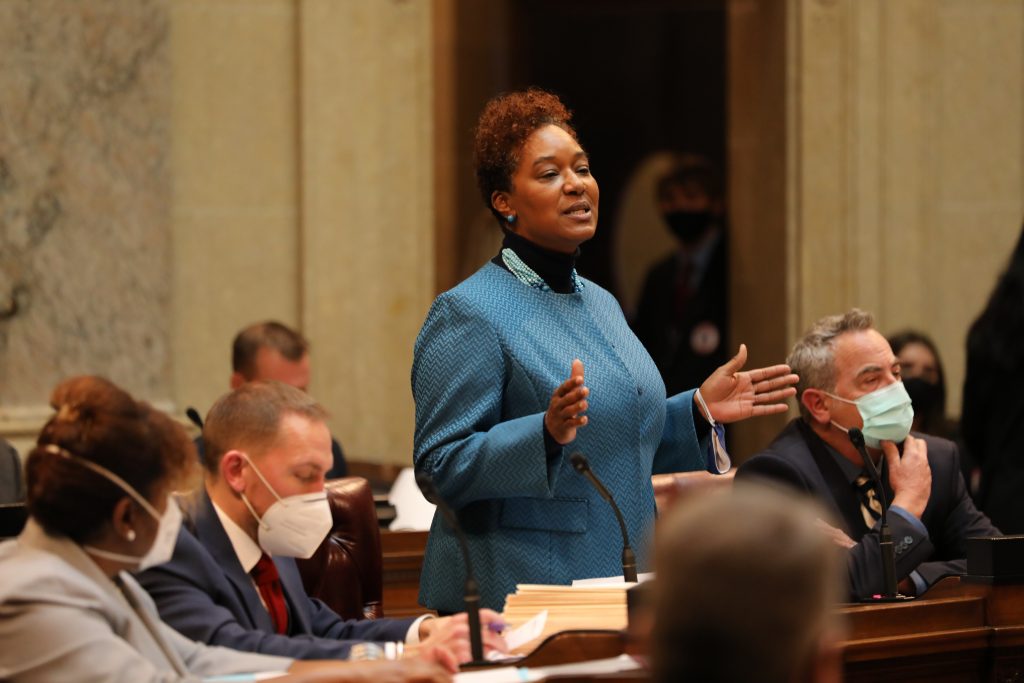
State Sen. Lena Taylor, D-Milwaukee, is part of a bipartisan group of Wisconsin lawmakers seeking to establish state assistance for people who purchase property that they do not know is contaminated. She is seen in the Senate chambers at the Wisconsin State Capitol on Jan. 25, 2020 in Madison, Wis. (Coburn Dukehart / Wisconsin Watch)
Taylor doubts the legislation will get financial support from the state Legislature — or that Evers’ Revitalize Wisconsin proposal will survive the Republican-controlled finance committee, whose leaders have vowed to toss out Evers’ budget and start from scratch.
Even Koeppler’s own representative, Kelda Roys, D-Madison, opposes the bill, saying in a letter to his attorney that it “fails to achieve the most important goal, which should be remediating the contamination to prevent further harm.” However, Roys offered to work with Koeppler’s lawyer to craft legislation she could support.
Taylor said she sees Evers’ program as the best way forward, as it could take the place of the “innocent purchaser” legislation with funding already built into the proposal. The DNR said it believes Revitalize Wisconsin provides a definition that incorporates innocent landowners.
“It could be a win-win,” Taylor said. “The question is whether or not the co-chairs of finance and leadership agree.”
While politicians debate how to help property owners like Koeppler, he said the contamination and cleanup costs at his building continue to take a toll. He had hoped to retire by now, but the responsibility for the cleanup has him trapped.
“I can’t sell that property,” said Koeppler, who is 71. “I pretty much have to be a landlord until the day I die.”
The nonprofit Wisconsin Watch (www.WisconsinWatch.org) collaborates with WPR, PBS Wisconsin, other news media and the University of Wisconsin-Madison School of Journalism and Mass Communication. All works created, published, posted or disseminated by Wisconsin Watch do not necessarily reflect the views or opinions of UW-Madison or any of its affiliates.
-
Wisconsin Lacks Clear System for Tracking Police Caught Lying
 May 9th, 2024 by Jacob Resneck
May 9th, 2024 by Jacob Resneck
-
Voters With Disabilities Demand Electronic Voting Option
 Apr 18th, 2024 by Alexander Shur
Apr 18th, 2024 by Alexander Shur
-
Few SNAP Recipients Reimbursed for Spoiled Food
 Apr 9th, 2024 by Addie Costello
Apr 9th, 2024 by Addie Costello





